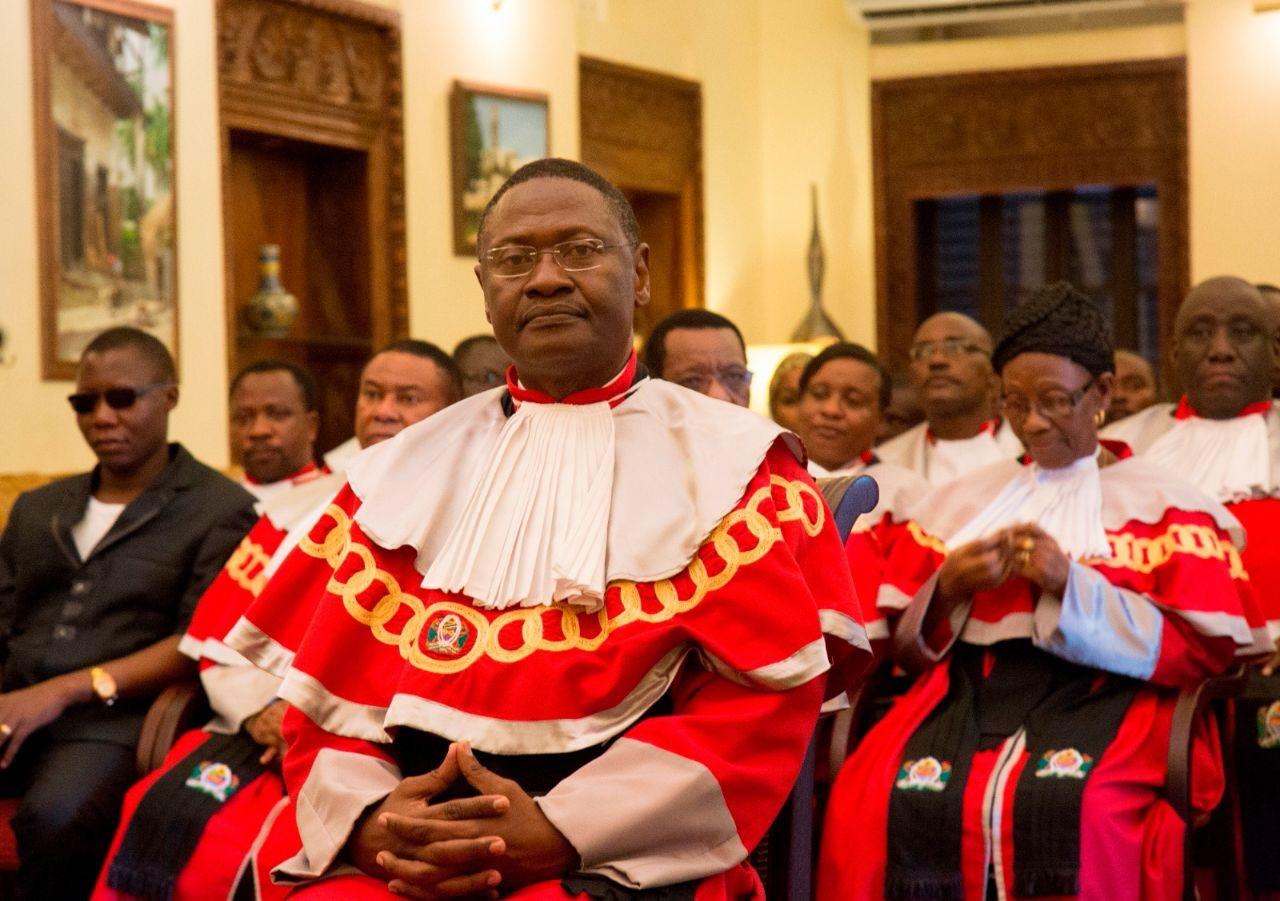Africa-Press – Tanzania. AS the 3rd Five-Year National Development Plan gets underway, the Judiciary of Tanzania cherishes its tremendous achievements in promoting access to justice and rule of law in the past five years.
The Chief Court Administrator, Mr Mathias Kabunduguru, says that on the back of a successful five year period, the Judiciary is looking forward to post significant feats in the improvement of the judicial system.
He says the Judiciary would play its part to promote access to justice and rule of law as precondition for equitable development enshrined in the constitution of the United Republic of Tanzania as well as the 2025 National Development Vision.
The Judiciary is prepared to implement the Third Five-Year National Development Plan 2020/21-2025/26 (FYDP III) to ensure cases are settled timely so that people can concentrate on economic activities as the country is striving towards a full middle income economic status by 2025, according to Mr Kabunduguru.
It is indicated in the FYDP III report, launched by Prime Minister Kassim Majaliwa recently that the Judiciary continued to discharge its core obligation of administration of justice during implementation of the Second Five-Year National Development Plan (FYDP II) 2015/2016-2019/2020.
A total of 243,464 cases, which is equivalent to 102 per cent of all cases filed, were decided. The disposal of cases left behind 62,175 cases only pending at all court levels as of December 31, 2020. It is indicated also that at the close of the year 2019, there were 66,873 cases in total at different court levels, which were pending, but between January and December 2020, about 238,766 new cases were filed before diverse courts.
The report shows that within the period, there were also improvements of infrastructures, notably the renovation of three High Courts, completion of the construction of five resident magistrate courts, completion of the construction of 15 District Courts and also completion of the construction of 18 Primary Courts.
President Samia Suluhu Hassan is on record expressing her government’s commitments to closely work with the Judiciary in order to strengthen the justice system and improve court’s infrastructure, notably, constructions of court buildings at different levels.
When addressing the National Assembly recently, she pointed out that the government would continue to support the judiciary to increase efficiency, including appointment of more judges and magistrates and promote the use of Information and Communication Technology (ICT) to speed up hearing of cases.
The president walked the talks when she appointed 28 new judges, the largest number ever in the Judiciary’s history, in the government move to improve operations and efficiency of the Judiciary of Tanzania.
They included seven Justices of the Court of Appeal and 21 Judges of the High Court. She also explained before the House on April 22, 2021 that the sixth phase government would continue to support other institutions in the management of justice, including the Office of the Attorney General in order to speedup delivery of justice.
President Samia named the other institutions as the Solicitor General’s Office, the National Prosecutions Services under the Director of Public Prosecutions (DPP), the Police Force, the Prevention and Combating of Corruption Bureau (PCCB), Prisons Department and other similar institutions.
When moving the budget estimates for 2021/2022 financial year in Dodoma recently, the Minister for Justice and Legal Affairs, Prof Palamagamba Kabudi, said that the Judiciary of Tanzania continued to implement a strategy to reduce the backlog of cases to ensure citizens get justice in a timely manner.
He told the National Assembly that in July 2020, Courts started with a total of 68,581 cases and registered 175,311 new ones, where as of March, 2021 a total of 177,344 cases were heard, equivalent to 73 per cent and 66,548 cases, equivalent to 27 per cent, remained and are at various stages.
The minister also pointed out that the Court of Appeal started with 3,966 appeals and registered 1,583 new ones where as of March, 2021 831 appeals, equivalent to 15 per cent, were heard with 4,718 appeals or 85 percent remaining. On part of the High Court and its Zones, he said, the Court started in July, 2020 with 13,410 cases and new registered ones were 9,791, where as of March, 2021 a total of 10,156 cases, equivalent to 44 per cent, were heard and 13,045 cases, equivalent to 56 per cent, were pending.
Prof Kabudi said also that the Divisions of the High Court started with 4,837 cases and registered 3,567 new cases, whereas at March, 2021 a total of 3,485 cases, equivalent to 41 per cent were heard and remained with 4,919 cases, equivalent to 59 per cent, which are in various stages of hearing.
He also disclosed that the Resident Magistrate’s Courts started in July, 2020 with 9,838 cases and registered 8,686 new ones where as of March, 2021 a total of 9,820 cases, equivalent to 53 per cent were heard and remained with 8,704 cases, which is equivalent to 47 per cent.
In addition, the minister said that the District Courts started in the year with 17,308 cases and the period under review registered 30,573 new cases, where 30,244 cases, equivalent to 63 per cent, were heard and 17,637 cases, equivalent to 37 per cent, remained.
Similarly, he said, the Primary Courts started in July, 2020 with 19,222 cases and registered 121,111 new ones where up to March, 2021, a total of 122,808 cases, equivalent to 88 per cent were heard and remained with 17,525 cases, equivalent to 12 per cent, which are in various stages of hearing.
During the implementation of FYDP II, the government also continued to fight corruption with efforts being directed towards addressing various dimensions of corruption including political and bureaucratic corruption, public funds embezzlement, fraudulent procurement practices and judicial corruption.
Some of the actions taken during this period include the establishment of the Corruption and Economic Crimes Division in the High Court of Tanzania, an initiative that went along with introduction of heavy penalties in all corruption-related cases to serve as deterrence.
Furthermore, it is indicated in the FYDP III report that during the implementation of the plan, the numbers of corruption cases ruled have increased from 10.4 per cent in 2015/16 to 82.0 per cent in 2019/20.
A table of progress made by Prevention and Combating of Corruption Bureau (PCCB) in fighting against corruption shows that between 2015/2016 and 2019/2020, the total number of allegations received by the PCCB was 45,026, the investigation files completed were 4,623.
The files under investigations were 8,606, whereas investigations on files closed were 302 and the files sent to the Director of Public Prosecutions (DPP) for his decision were 2, 209. New cases filed into courts were 2,456 and those pending were 3,109, while conviction of cases recorded were 1,059, acquitted cases recorded were 876 and the total cases ruled include 1,935 and the assets or funds recovered worth of 317.7bn/-.
“The trend of new cases filed in courts from 2016 to 2020 and number of cases prosecuted portrays the efforts and emphasis that the PCCB has taken in fighting corruption. These efforts enabled the government to recover around 215.45bn/- between 2016 and June 2020,” reads part of the report.
Additionally, the PCCB established Public Expenditure trucking of development projects through District and Regional Offices and Asset Tracing and Asset Recovery Unit, which is responsible for tracing and recovery of assets or funds corruptly acquired.
On effective and efficient justice service delivery systems, it is indicated in the report that systems facilitating equitable and timely access to justice to all are important in the promotion of a just and equal society and would be possible in the presence of sound institutional systems.
These systems consist of professional and ethical civil servants, tools, enabling infrastructure and friendly guidelines in dispensing justice. On such a basis, justice systems are one of the key pillars of good governance.
Under the circumstances, during implementation of the FYDP III there would be interventions, which include strengthening inclusive legal systems and infrastructure, promoting the use of inclusive ICT in access and delivery of justice and strengthening inclusive legal information and archive management.
Others are strengthening guidelines and procedures for the provision of legal aid and assistance and strengthening birth and death registration services.
The government targets to increase the percentage of citizens residing in regions with functional High Court from 69 2019 to 100 by 2025/26, cases represented by Legal Aid Providers from 0.13 2019 to 2.0 by 2025/26 and number of IJCs constructed and made operational in select locations from 10 to 28.
There would be an increase in the number of District Court buildings constructed from 64 to 139, Primary Court buildings constructed from 649 to 791, number of Attorney General’s Offices constructed in Regions from zero to 10 and number of National Prosecutions Offices constructed in Regions from one to seven.
The target also will be to increase the number of Districts with registered Legal Aid Providers from 52 to 138 and the number of institutions integrated with ICT in justice delivery services would also increase from two to eight.
On efficiency in justice delivery, it is anticipated by 2025/2026 the average number of days from the date of case filing to the date of case execution will decrease from 390 to 350 and the time it takes from the date of filing to the date of decision of a case, at Commercial Court from 480 to 350.
The number of Laws and Rules of Procedure Reviewed will increase from 410 to 1,410, while the number of laws and rules translated from English to Swahili will increase from 50 to 250 and the percentage of case backlog to the total pending cases in the court system will decrease from five to two.







